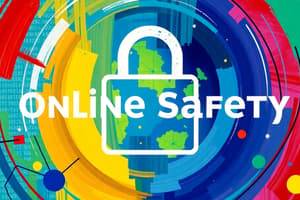Podcast
Questions and Answers
What is the primary focus of online ethics?
What is the primary focus of online ethics?
- Preventing cybercrime and protecting intellectual property
- Guiding online behavior with respect for others' privacy and security (correct)
- Protecting personal data and ensuring digital evidence admissibility
- Regulating online transactions and enforcing digital laws
Which of the following is an example of cybercrime?
Which of the following is an example of cybercrime?
- Hacking into a company's database to steal sensitive information (correct)
- Downloading a copyrighted song from a legitimate music streaming service
- Participating in online discussions to promote a brand's product
- Conducting online research for a school project
What is the purpose of data minimization in data privacy?
What is the purpose of data minimization in data privacy?
- To make data accessible to a wider audience
- To collect and store only necessary data (correct)
- To ensure the accuracy and completeness of collected data
- To protect sensitive information from unauthorized access
What type of intellectual property protects brand names, logos, and symbols?
What type of intellectual property protects brand names, logos, and symbols?
What is the importance of chain of custody in digital evidence?
What is the importance of chain of custody in digital evidence?
What is the primary concern of digital evidence in legal proceedings?
What is the primary concern of digital evidence in legal proceedings?
What is the primary motivation behind utilitarianism in online ethics?
What is the primary motivation behind utilitarianism in online ethics?
How does deontology influence online behavior?
How does deontology influence online behavior?
What is the primary purpose of digital rights management (DRM) in relation to intellectual property?
What is the primary purpose of digital rights management (DRM) in relation to intellectual property?
What is the significance of network logs and traffic data in digital evidence collection?
What is the significance of network logs and traffic data in digital evidence collection?
What is the primary concern of netiquette in online interactions?
What is the primary concern of netiquette in online interactions?
What is the role of fair use and exceptions in intellectual property law?
What is the role of fair use and exceptions in intellectual property law?
What is the main difference between confidentiality and integrity in the context of data privacy?
What is the main difference between confidentiality and integrity in the context of data privacy?
What is the primary goal of anonymization and pseudonymization in data privacy best practices?
What is the primary goal of anonymization and pseudonymization in data privacy best practices?
What is the main difference between hacking and unauthorized access in the context of cybercrime?
What is the main difference between hacking and unauthorized access in the context of cybercrime?
What is the purpose of the Cybercrime Convention in the context of cybercrime laws?
What is the purpose of the Cybercrime Convention in the context of cybercrime laws?
What is the primary principle guiding online behavior in online ethics?
What is the primary principle guiding online behavior in online ethics?
What is the significance of digital forensics and evidence collection in the investigation and prosecution of cybercrime?
What is the significance of digital forensics and evidence collection in the investigation and prosecution of cybercrime?
Flashcards are hidden until you start studying
Study Notes
Online Ethics
- Refers to the moral principles and values that guide online behavior
- Includes considerations such as:
- Respect for others' privacy and security
- Avoidance of harm or malicious intent
- Honesty and transparency in online interactions
- Compliance with online laws and regulations
Cybercrime
- Refers to criminal activities carried out using digital technologies
- Examples:
- Hacking and unauthorized access
- Identity theft and phishing
- Online fraud and scams
- Distribution of malware and viruses
- Cyberstalking and harassment
Data Privacy
- Refers to the protection of personal information and data from unauthorized access or misuse
- Key concepts:
- Confidentiality: protecting sensitive information from unauthorized access
- Integrity: ensuring data accuracy and completeness
- Availability: ensuring data is accessible when needed
- Data minimization: collecting and storing only necessary data
- Anonymization: removing personal identifiers from data
Intellectual Property
- Refers to the legal rights protecting creative works and innovations
- Types of intellectual property:
- Copyrights: protecting original literary, dramatic, musical, and artistic works
- Patents: protecting inventions and innovations
- Trademarks: protecting brand names, logos, and symbols
- Trade secrets: protecting confidential business information
Digital Evidence
- Refers to electronic data used as evidence in legal proceedings
- Types of digital evidence:
- Network logs and traffic data
- Email and messaging records
- Computer and mobile device data
- Digital images and videos
- Online transaction records
- Importance of digital evidence:
- Authenticity: ensuring the integrity and reliability of digital evidence
- Chain of custody: maintaining a secure and documented trail of evidence handling
- Admissibility: ensuring digital evidence is legally admissible in court
Studying That Suits You
Use AI to generate personalized quizzes and flashcards to suit your learning preferences.




